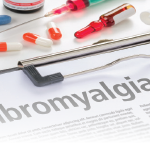“Depending on the genes you are born with, it may be more likely that these symptoms will happen to you after trauma,” Dr. Clauw said, going on to say hyperalgesia or allodynia are common terms for people who experience problems such as fibromyalgia, tension headaches and migraines, irritable bowel syndrome, and other symptoms.
Although certain studies have tracked sensitivity to pain to stressors from childhood, Dr. Clauw said it may be surprising to know that psychological distress doesn’t necessarily trigger pain right away. “Baseline psychological distress is only weakly associated with the subsequent development of chronic widespread pain,” he said. “The overwhelming number of individuals did not have high levels of stress before they had widespread pain.”
Two studies that took place following the terrorist attacks on September 11, 2001, led to further study of the relationship of stress and development of symptoms. In one study, 1,312 women in the New York City metro area were initially surveyed for pain and psychiatric symptoms before September 11 and then recontacted six months later to assess symptoms and terrorism-related exposures. Investigators compared “fibromyalgia-like” four-quadrant pain reports at baseline and follow-up.4 They found that event exposure did not relate to the fibromyalgia-like symptoms and that depressive symptoms at baseline did not interact with exposure to the terrorist attacks.
In the second study, eight fibromyalgia patients in the Washington, D.C. area used handheld devices to rate their pain on a scale four to six times a day.5 Patients rated their pain daily from August 28, 2001, to September 25, 2001. The study found that pain levels in the days after the attack did not differ significantly than pain levels before the attack. “This result is consistent with previous work suggesting minor daily problems rather than major events may drive somatic symptom expression,” the study investigators wrote, although they acknowledged that their study size was small.
Naturally, the kinds of medication that work best for fibromyalgia and similar patients, such as tricyclic compounds, serotonin–norepinephrine reuptake inhibitors, and norepinephrine selective reuptake inhibitors, are different from opioids and other medicines, including antiinflammatory drugs, that work for other types of pain and pain patients, Dr. Clauw said.
He noted that this line of research requires more investigation. “When we send people to war, they come back with pain, fatigue, and other symptoms. We need to do a better job of understanding the underlying pathogenesis,” he said.
Vanessa Caceres is a medical writer in Bradenton, Florida.
References
- Hyams KC, Wignall FS, Roswell R. War syndromes and their evaluation: From the U.S. Civil War to the Persian Gulf War. Ann Intern Med. 1996;125:398-405.
- Fukuda K, Nisenbaum R, Stewart G, et al. Chronic multisymptom illness affecting Air Force veterans of the Gulf War. JAMA. 1998;280:981-988.
- Clauw DJ, Engel CC Jr, Aronowitz R, et al. Unexplained symptoms after terrorism and war: An expert consensus statement. J Occup Environ Med. 2003;45:1040-1048.
- Raphael KG, Natelson BH, Janal MN, Nayak S. A community-based survey of fibromyalgia-like pain complaints following the World Trade Center terrorist attacks. Pain. 2002;100:131-139.
- Williams DA, Brown SC, Clauw DJ, Gendreau RM. Self-reported symptoms before and after September 11 in patients with fibromyalgia. JAMA. 2003;289:1637-1638.

